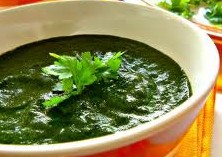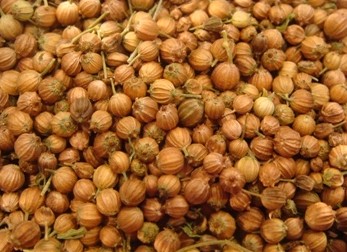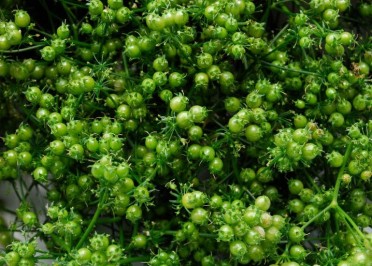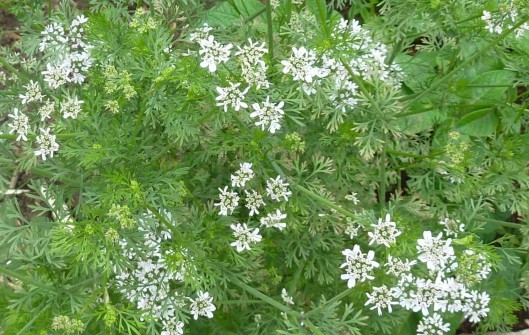“Coriander” – We all are acquainted with this term. We have it in our daily meal but very few of us are aware about its several names and its nutritional importance for our health. It is also known as cilantro, Chinese parsley and dhania. Dhania word is commonly used in India. In India, coriander is known by several other regional names like Dhane in Bengali; Kothmiri and Libdhana in Gujarati; Kothambri in Kannada; Daaniwal and Kothambalari in Kashmiri; Kothumpalari bija in Malayalam; Dhana in Marathi; Dhanyaka in Sanskrit; Kothamalli in Tamil; Dhaniyalu in Telugu.

The Botanical name of coriander is Coriandrum sativum Linn, which is further classed within the Family name of Umbelliferae. Cilantro is the Spanish word for coriander, also derived from coriandrum. It is a common term in North America, due to its extensive use in Mexican cuisine.
It is a popular ingredient in the cuisines of many nations. Chinese parsley is used both fresh and dried, and is readily available in most markets, due to its enduring popularity. Chinese parsley quickly spread, and it was embraced by Thai, Indian, and Chinese cooks.
Coriander requires a cool climate during growth stage and a warm dry climate at maturity. It can be cultivated in almost all types of soils. Its usage in India is in cooking, in producing oils, as a spice, in medicine, in ayurveda, the usage of coriander is in the culinary and cuisine section, also serving as chutney, as soup, as curry pastes, in making dal, and preparing pickles.

All parts of the plant are edible, but the fresh leaves and the dried seeds are the parts most commonly used in cooking.
NUTRITONAL IMPORTANCE
- Coriander or cilantro contains many compounds which have anti oxidant properties.
- The flavor of coriander and cilantro is due to the fatty acids and volatile oils in it.
- Coriander is rich in dietary fiber providing as much as 42 gms fiber in 100 gms of coriander.
- This fiber helps in lowering the LDL cholesterol as it binds to the bile salts.
- Coriander contains very good amounts of minerals like iron, copper, calcium, potassium, manganese, magnesium and zinc.
- It also has high levels of vitamin C.
- Coriander is also a storehouse of the B complex vitamins, especially thiamine, niacin and riboflavin.
- Coriander oil is extracted from the seeds contain anti bacterial properties and is rich in phytonutrients, flavonoids and active phenolic compounds.

- A, beta carotene, vitamin-C that are essential for optimum health. Vitamin-C is a powerful natural antioxidant. Cilantro leaves provides 30% of daily recommended levels of vitamin-C.
HEALTH BENEFITS
- It is known for building the stomach and promoting digestion. Dry coriander treats diarrhea.
- The leaves and seeds contain many essential volatile oils such as borneol, linalool, cineole, cymene, terpineol, dipentene, phellandrene, pinene and terpinolene and have rich aroma, they acts as an excellent appetizer and helps to stimulate the secretion of enzymes and digestive juices in the stomach.
- It also helps in stimulating digestion and peristaltic motion.
- Coriander leaves are also helpful in treating anorexia.
- Fresh coriander leaves are good source of oleic acid, linoleic acid, stearic acid, palmitic acid and ascorbic acid (vitamin-C), which are very effective in decreasing the cholesterol level in the blood.
- Coriander or cilantro herb contains no cholesterol; but is rich in anti-oxidants and dietary fiber which help in reducing LDL or “bad cholesterol” while increasing HDL or “good cholesterol” levels.

- It is helpful in decreasing the deposition of cholesterol along the inside layer of the arteries and veins and thereby reduce the risk of heart attack.
- Fresh coriander leaves are helpful to treat some skin disorders due to its anti-fungal, anti-septic, detoxifying, and disinfectant properties. “To get relief from hives, drink it as a juice or make a paste to apply to the skin. For rashes/hives, mix fresh coriander juice & honey and apply this paste on the skin area which is affected. Leave it on the skin for at least 15 minutes, before rinsing off with cool water.”
- Fresh coriander leaves are great source of vitamin-C, vitamin-A, anti oxidants, and minerals such as phosphorus which are helpful to ease muscular degeneration, conjunctivitis, aging of eyes, and sooth eyes against stress.
- Coriander is one of the richest herbal sources for vitamin K. Vitamin-K has potential role in bone mass building by promoting osteotrophic activity in the bones.
- It also has established role in the treatment of Alzheimer’s disease patients by limiting neuronal damage in their brain.
- It is also beneficial for women especially those suffering from a heavy menstrual flow.
- Coriander is known to lower blood sugar by stimulating the secretion of insulin. It has also been called as an ‘anti-diabetic’ plant.
- The aroma of fresh coriander leaves is also helpful for Epistaxis (Nose bleed).
- Coriander leaves are rich source of anti oxidant, anti microbial, and anti infectious components and acids. Also, the presence of iron and vitamin-C strengthen the immune system. They have a soothing effect on pox and also decrease the pain of small pox.
- Essential oils of coriander contain citronelol, a component which has an excellent antiseptic property. Additionally, other components of the coriander like essential oil have anti microbial and healing effects which prevent the worsening of the wounds and ulcers in the mouth. They freshen up the breath and help in healing of ulcers.
- It helps in reducing brain fag, tension, migraine and nervous weakness.
- It also relieves gas and stomach ache.
- It controls rheumatic and arthritic pains, muscle spasms.
- It benefits in colds and flu.

- It removes toxins and wastes.
- This herb is also great for the skin. Its juice mixed with turmeric powder can help treat pimples and blackheads.
- Coriander has been used as a folk medicine for the relief of anxiety and insomnia in Iran.
- Coriander is known as best cleaning treatment for kidneys and it is natural. Drink one glass coriander juice daily will help in removing accumulated poison from kidney by urination.
The coriander leaves, seeds, stems and their oils all are used in many traditional medicines as analgesic, aphrodisiac, anti-spasmodic, deodorant, digestive, carminative, fungicidal, lipolytic (weight loss), stimulant and stomachic.
Coriander can produce an allergic reaction in some people. But it’s very rare; normally it has no side effect.
No comments:
Post a Comment